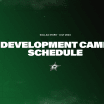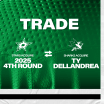"It was good there," he said. "They had good players, we won a lot. It was fun."
Hitchcock said one of the best things the Stars did was put Zubov on the penalty kill. He said that challenging the talented blueliner's overall game proved a perfect motivational tool. Add to that they allowed him to share his vision of the game with coaches and teammates, and the fit started to appear pretty quickly.
"I think he wanted to be respected for his craft, that's really at the heart of it," Wilson said. "He wanted people to understand how he saw the game, and that was always easy for me. He was always very respectful, so it was a mutual feeling."
In fact, the players loved Zubov's thirst for creativity, especially in a system that asked for a lot of conservative decision-making. With players like Mike Modano, Brett Hull and Joe Nieuwendyk, the hunger to make plays out of the team's defensive base proved infectious.
"He was respected by Hall of Fame players, because they knew he could help make them better and he could help them win games," Ludwig said. "All you had to do was play one game with him, and you could see just how much he affected every game. He played a smart game and he made smart players even better. That's saying a lot right there."
Modano and Zubov used to play a game after practice or at the morning skate. Each player would stand on an opposite side board and flip pucks back and forth to the other across the width of the rink. The puck had to bounce once before it got to the defending player. If it hit the wall, the shooting player received a point. If it didn't, the score stayed the same.
"It was something he liked to do and he got me into it, and it just kind of took off from there," Modano said. "It was simple enough, but it taught you how to control the puck when you were throwing passes and it taught you how to catch a bad pass, so I think it did make you better. Back then, the ice at Reunion wasn't great, so the puck was bouncing a lot in the last 10 minutes of a period, and it just kind of got you used to it. He was always thinking about things like that."


















